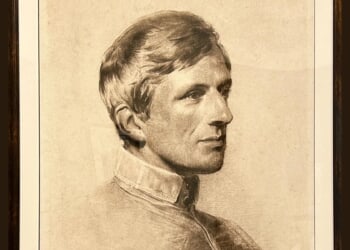Do you remember when professional athletes worked hard, played hard, and never acted like vain teenage girls obsessed with taking selfies and posting TikToks?
Kasey Keller, a former U.S. Men’s National Team (USMNT) soccer player, took a dig Monday at two young American stars, Christian Pulisic and Tim Weah, arguing that they are “more interested in taking Instagram photos” than taking U.S. soccer to the next level to really challenge the world’s best teams. In the recently released episodes of the docuseries “PULISIC,” both Pulisic and Weah addressed criticism from former U.S. players, prompting Keller to fire back. (Subscribe to MR. RIGHT, a free weekly newsletter about modern masculinity)
“I’m not asking you to have a great game every time you step on the pitch — we know that’s impossible,” Keller said on ESPN FC. “All I’m asking you is to show 100% commitment every time you step on the pitch, and I don’t think anybody watching the US national team over the last year can be honest with themselves and say that you’ve consistently seen a team that is giving 100% every time they step on the pitch.”
“This is stuff they’ve invented. They’ve gone on social media, they’ve got a docu-series … you’ve invented this.” 😯
USMNT legend Kasey Keller responds to the comments made by Christian Pulisic and Tim Weah, criticizing the media and former players. pic.twitter.com/X3sTUNU7t1
— USMNT Only (@usmntonly) August 18, 2025
Keller’s point doesn’t only apply to the USMNT and its young talent. This seems to be the case with numerous athletes in 2025, young and old, who are obsessed with social media clout or let petty social media fracas get to their heads. They seem to care more about building their personal “brands” and picking fights online, and less about the game that made them famous in the first place.
Travis Kelce is an example of a once-great athlete focused on his game, turning into a media figure and pop culture icon, but so, too, are NBA stars LeBron James, Kevin Durant, and Ben Simmons. Durant has previously used burner accounts and even picked a fight with a teenage fan on Instagram. As Simmons was playing terribly in recent seasons, he was still posting pictures of his flashy lifestyle on social media — and took heat from fans fed up with his poor play. (RELATED: What The Hell Is Happening To Travis Kelce?)
Travis Kelce shot by Ryan McGinley and styled by @LuxuryLaw for the September issue of GQ https://t.co/MpOWZ0mTiZ pic.twitter.com/Iyuy3AFuHg
— GQ Magazine (@GQMagazine) August 12, 2025
JuJu Smith-Schuster, Kelce’s talented teammate in Kansas City, earned the nickname “TikTok Boy” for his prolific use of the app. He has also streamed himself playing video games on the platform Twitch, along with rappers Drake and Travis Scott.
But, of course, there was a time when social media did not exist; when athletes were not as concerned with their image. They couldn’t even be obsessed with their online presence because, well, there was no “online.”
The 1993 Philadelphia Phillies are a great example of professional athletes in a pre-social media world, having fun yet still devoted to the game. They were a rag-tag group of individuals, party animals who drank beer, smoked cigars, and even played games hungover. But as Philadelphia Magazine described them, they were “obsessed” with baseball and “went to the ballpark early and stayed late (if they left at all).” They nearly won a World Series that year.
One player from that team, phenom John Kruk, was a monster hitter. He was also — and still is — a fascinating, funny dude. During a Phillies broadcast Monday, Kruk hilariously asked colleague Tom McCarthy, who was eating a Philly cheesesteak, “If I ever become a vegan, would you just punch me in the face as hard as you can?”
For the 2003 documentary “High Hopes: The Anatomy of a Winner,” Kruk gave viewers a tour of the Phillies locker room and reminisced on his teammates and their personalities. Some of them were hilarious; others had a temper. Kruk, himself, was a slob. Like today’s athletes, their big personalities may have gotten in the way of performing well on the field, but they never had the temptation of social media. Even if social media existed then, the ’93 Phillies were probably too “obsessed” with baseball to ever even consider creating burner accounts to argue with fans after a bad game.
There are plenty of modern-day athletes who have colossal followings on social media. Take international soccer star Cristiano Ronaldo, for example. Besides Instagram’s own account, Ronaldo has the highest number of Instagram followers on the platform, clocking in at nearly 663 million followers.
To say Ronaldo is vain is an understatement. At 40, though, he is still a machine playing in Saudi Arabia, and he never let his massive social media presence get in the way of his game earlier in his career while playing at Real Madrid. The same cannot be said of Kelce, LeBron, Durant, and Smith-Schuster: they all seemed to have gotten caught up in the eyeball-grabbing vortex that is social media, much to their detriment.
Plenty of athletes also don’t drink as prolifically as they once did, and most have stricter workout routines and healthier, meticulously planned diets. They certainly don’t smoke. And that’s admirable. Dedicated athletes who train tirelessly and treat their bodies properly should be celebrated.
But athletes addicted to the social media limelight have robbed their respective sports of a magical quality: the ability to work hard, play hard, but keep their game as sharp as ever — and actually win. In Philadelphia, in 1993, that magic was on full display. It’s too bad more athletes aren’t like that.











![Florida Man With Violent History Arrested for Choking a Cop [WATCH]](https://www.right2024.com/wp-content/uploads/2025/06/Eleven-Stabbed-in-Attack-at-Salem-Homeless-Shelter-Across-From-350x250.jpg)





